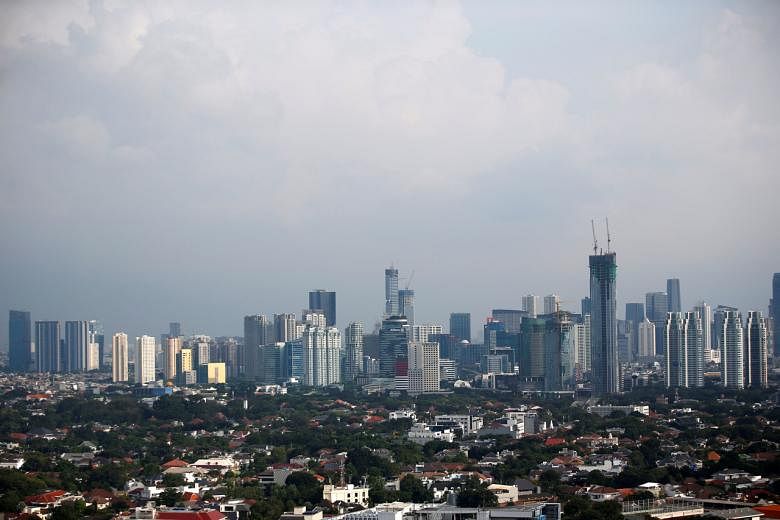JAKARTA (THE JAKARTA POST/ASIA NEWS NETWORK) - For many Indonesians, the Idul Fitri mudik (exodus) is an important tradition that they must prepare for months ahead of Ramadhan, with train and bus tickets in high demand.
But the SARS-CoV-2 outbreak has forced many living in Jakarta - a city thousands have migrated to from around the country in search of work - to cancel their plans to celebrate Idul Fitri in their hometowns, even if they already have their ticket in their hands.
One of them is Mr Anggit Rizki, a 25-year-old worker living in West Jakarta, who in previous years had always returned to his hometown of Malang, East Java, to celebrate Idul Fitri with his family.
"I have never celebrated Idul Fitri in Jakarta because I don't know what to do here," he told The Jakarta Post on Wednesday (April 22).
Mr Anggit initially still intended to go on mudik, even though he was aware of the central government's advice against it. He had even prepared masks and hand sanitiser for his trip and planned to follow the quarantine protocol in Malang once he arrived.
However, he changed his mind after President Joko Widodo announced a ban on the Idul Fitri mudik on Tuesday and decided to request a refund for the train ticket he bought in February, even though it would mean spending the holiday alone.
"Because of the Covid-19 outbreak, I decided not to go on mudik this year," he said.
Ms Naila Fauzia Mastutie, a 31-year-old civil servant living in East Jakarta, also decided to cancel her ticket to her hometown in Tulungagung regency, East Java, which she bought at the beginning of the year.
"I realised that it's not good enough to protect myself, I need to protect my family and other residents in my hometown too," she told the Post on Tuesday.
Millions of people return to their hometowns every year - often travelling from urban centres to the countryside - to celebrate Idul Fitri, with about 20 million leaving Greater Jakarta alone every year during the Islamic holiday.
With Jakarta the country's epicentre of the virus outbreak, the huge number of expected travellers has raised concerns about mass contagion, with public health experts warning that mudik could cause the respiratory illness to spread rapidly across Java.
The severity of the threat finally convinced Mr Joko to ban the Idul Fitri mudik altogether, weeks after his administration had maintained its previous policy of merely advising the public against it.
Mr Joko announced the ban after reading a Transportation Ministry survey that found that 24 per cent of the country's 270 million people still planned to travel to their hometowns and that 7 per cent had already left.
For civil servants and their families, meanwhile, mudik was prohibited far earlier, with Administrative and Bureaucratic Reform Minister Tjahjo Kumolo saying that they could not travel to their hometowns from April 6 until the country "is free of Covid-19".
As of Wednesday, Indonesia had recorded 7,418 confirmed cases of Covid-19 with 635 deaths. Jakarta alone had reported 3,383 cases and 301 deaths, nearly half the country's cases.
Acknowledging the danger the virus posed, Mr Audy, a 47-year-old private employee living in North Jakarta, decided to cancel his Idul Fitri plans and expressed hope many others would do the same.
"I hope other citizens also comply (with the government's ban)," he told the Post on Wednesday.
Coordinating Maritime and Investment Minister Luhut Binsar Pandjaitan, who is also the acting transportation minister, said the ban would begin on Friday with travel restrictions to be imposed in Covid-19 red zones that could be sanctioned starting May 7.
Road use, however, will not be completely blocked, as public transportation services across Greater Jakarta will continue to operate to service those who still need to commute to work, including health workers and hospital staff.
Transportation Ministry spokesman Adita Irawati said on Wednesday that the ministry was preparing a regulation on the mudik ban that would include the sanctions that would be imposed. Transportation of aid and other emergency services will be exempted from the regulation, she said.
Ms Adita said the ministry would limit access to regional entry points instead of blocking roads.
State-owned railway operator PT Kereta Api Indonesia (KAI) has announced that it will give full refunds to passengers who decide to cancel their trips. Those who have booked tickets with national flag carrier Garuda Indonesia, meanwhile, are able to reschedule their flights or receive a refund with vouchers.











